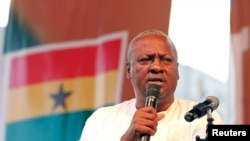ACCRA —
Ghana’s Supreme Court is asking for final written arguments by the end of July in an opposition case challenging the 2012 election of President John Mahama. The court will rule in August on the petition to overturn the election in what is considered one of Africa’s most stable democracies.
Just weeks after the December 7 election of John Mahama, the opposition New Patriotic Party (NPP) went to the Supreme Court complaining of election irregularities.
Mahama won in the first round with 50.7 percent of the vote in an election certified as free and fair by the election commission and the international community.
But the NPP alleges fraud based on data from polling stations, including over voting and voting by people not registered by the new biometric finger printing system.
Those leading the petition are presidential candidate, Nana Addo Dankwa Akufo Addo, his running mate, Mahamudu Bawumia, and the national chairman of the party, Jake Obetsebi Lamptey. The respondents are President John Mahama, Ghana’s Electoral Commission and the governing National Democratic Congress.
This is the first time the position of president is being challenged in Ghana, and some have questioned if it will undermine the country’s strong democracy. But some political experts said the legal action is actually a good sign of the country’s political maturity.
“If people do not go to court, they will seek justice their own way and that would not even be justice. So the court is there for all of us," said Emmanuel Akwettey, executive director of Institute for Democratic Governance. "Nobody went on the streets because they believe that the court is doing the job. [They are] trained to do it, mandated to do it and empowered to do it.”
There has been lots of media coverage of this case and speculation if the decision will trigger violence.
Some civil society groups are circulating petitions for the public to commit to non-violence. Analyst Akwettey, who is also with Ghana’s Civic Forum Initiative, said those petitions will be published to serve as a reminder to Ghanaians of their commitment to peace, and politicians are being reminded to do the same.
“Violence is not an option at all after the verdict. Do not forget that we have done revolution in this country and we all decided that it must be democracy. That is the strength of Ghana. We sometimes get to the brink. But then we embrace ourselves and move on and say, we are one people,” he said.
The Supreme Court’s decision is expected by mid-August.
Just weeks after the December 7 election of John Mahama, the opposition New Patriotic Party (NPP) went to the Supreme Court complaining of election irregularities.
Mahama won in the first round with 50.7 percent of the vote in an election certified as free and fair by the election commission and the international community.
But the NPP alleges fraud based on data from polling stations, including over voting and voting by people not registered by the new biometric finger printing system.
Those leading the petition are presidential candidate, Nana Addo Dankwa Akufo Addo, his running mate, Mahamudu Bawumia, and the national chairman of the party, Jake Obetsebi Lamptey. The respondents are President John Mahama, Ghana’s Electoral Commission and the governing National Democratic Congress.
This is the first time the position of president is being challenged in Ghana, and some have questioned if it will undermine the country’s strong democracy. But some political experts said the legal action is actually a good sign of the country’s political maturity.
“If people do not go to court, they will seek justice their own way and that would not even be justice. So the court is there for all of us," said Emmanuel Akwettey, executive director of Institute for Democratic Governance. "Nobody went on the streets because they believe that the court is doing the job. [They are] trained to do it, mandated to do it and empowered to do it.”
There has been lots of media coverage of this case and speculation if the decision will trigger violence.
Some civil society groups are circulating petitions for the public to commit to non-violence. Analyst Akwettey, who is also with Ghana’s Civic Forum Initiative, said those petitions will be published to serve as a reminder to Ghanaians of their commitment to peace, and politicians are being reminded to do the same.
“Violence is not an option at all after the verdict. Do not forget that we have done revolution in this country and we all decided that it must be democracy. That is the strength of Ghana. We sometimes get to the brink. But then we embrace ourselves and move on and say, we are one people,” he said.
The Supreme Court’s decision is expected by mid-August.





